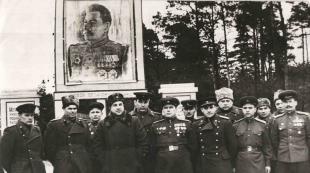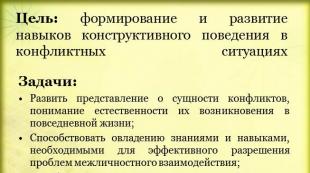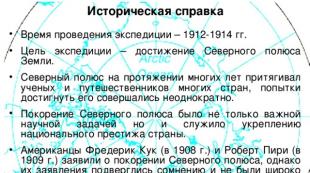Etiquette for every day class hour. Class hour on the topic: "Etiquette and us." Class hour on Etiquette in elementary school
Class hour "Let's talk about etiquette"
Goals:
cognitive: get acquainted with the history of etiquette, identify the level of their knowledge in this area, encourage them to apply this knowledge in practice.
educational: to promote the assimilation of etiquette norms by students and the improvement of the general culture.
developing: continue to develop the skills to work in a team, listen carefully and ask questions, adequately evaluate yourself and your actions.
Structure:
Consists of three stages.
design.
Selection of material, the place of this lesson in the system of class hours, the definition of goals, methods and forms of conducting.
2. research.
The work of students in microgroups on the proposed situations, compiling memos, questioning.
3. reflective.
Focused on understanding and understanding the results of their activities.
Research standards.
theoretical stage (class leader).
Practical (independent activity of students).
Time limit is 40 - 45 minutes.
Method
Group research activity of students, individual activity.
Result:
It is quite difficult to trace, ideally this is the assimilation of the norms of etiquette, the application of these rules in everyday life.
Introduction
Everything in a person should be perfect:
And face, and clothes, and soul, and thoughts.
A. P. Chekhov
The fast rhythm of modern life makes many demands on a person: to be educated, mobile, successful, creative - the list is endless. However, much in the life of every person depends on the ability to impress, listen carefully to the interlocutor, self-confidence, correct speech, etc. Etiquette permeates all aspects of a person's life. The foundations of this knowledge are laid in the family and school, and yet every person who enters an independent life and intends to realize his talents and abilities needs to improve and develop them.
Knowledge of etiquette opens the way to success in the personal and professional sphere and helps to avoid unnecessary stress and worries.
Therefore, I consider the choice of the topic "Etiquette" for class hours to be relevant and necessary.
Carrying out algorithm
From the history of etiquette (introductory remarks by class leader)
Etiquette is a word of French origin. It has entered the lexicon since the time of the French king Louis 14, who had the loud nickname of the Sun King for his extraordinary love of luxury. At one of the king's lavish receptions, the guests were given cards listing some of the mandatory rules of conduct. The word "etiquette" came from the French name for cards - labels.
In the 18th century, our mission in China collapsed because the Russian envoy refused to kneel before the emperor, because this was required by the etiquette of the Peking court.
In 1804, Adam Krusenstern, who brought the Russian embassy to Nagasaki with a ship, described with indignation the appearance of the Dutch. When a high-ranking Japanese appeared, they bent in a bow at a right angle, stretching their arms at their sides. After the unsuccessful Russian attempt to bow in this manner, the Japanese no longer worried about them. And again, our ancestors had to leave with nothing because of their unwillingness to observe stupid, in their opinion, rules of etiquette.
Tibetans, for example, when greeting, take off their headdress with their right hand, put their left hand behind their ear, and even stick out their tongues. Europeans limit themselves to raising their hats and giving a slight bow. The Japanese use three types of bows for greeting: low, medium and light. In the far north, the hunters, meeting, rubbed their noses. The valiant musketeers, bowing gracefully, waved their long-feathered hats. In the East, it was customary to put a hand to the forehead and to the heart, and in wine countries, as a greeting, they showed tongues to each other ... Now this seems ridiculous to us, doesn't it?
Updating the knowledge of the children about the rules of conduct.
What do you know about etiquette?
Are rules of etiquette necessary in modern life? Why?
Is it necessary to replenish knowledge about etiquette, in connection with changing living conditions.
Acquaintance with a person always begins with a greeting.
Remember the verbal greetings of the Russian and other peoples (Hello! How are you! Good afternoon! Great bulls!).
“Are your cattle healthy” - this phrase is pronounced by the Mongols. Representatives of the African Zulu tribe say: "I see you" In China, they ask: "Have you eaten today?" And they all mean the same thing. How does it sound in Russian? We simply say: “Hello”, that is, we wish our friend good health. At all times, it was considered the height of bad manners and disrespect for others if a person avoids greeting or does not respond to it.
And now let's check how much you master the art of etiquette and discover small secrets of behavior.
Study.
The guys are divided into groups depending on the total number, each microgroup receives a task.
The task includes a story with errors that need to be found and corrected, and the result of the work of the microgroup should be a memo with the rules of conduct, depending on the situation, which must be protected in front of other groups.
Task for m / y - 1.
Act one "Hi, birthday boy!"
Serezha has a birthday. He is waiting for guests, in the room mom is busy at the table, dad and Seryozha are watching TV, grandfather is reading a newspaper. The doorbell rings, Seryozha's classmates enter - Ilya and Nastya.
Seryozha: “Well, finally, I have already been waiting for you. Why couldn't they come earlier?!"
Ilya: “Seryozha, we congratulate you on your birthday!”
Nastya: "This is a gift from us to you." The guys give the birthday man flowers and a package. Seryozha leads the guys into the room and puts the gift on the shelf.
Seryozha: “My friends came to me. Call us when everything is ready, and for now we will play the console.
Mom: "Okay, kids. I'll try to get it done quickly. You really need to make more sandwiches.
Seryozha: “Daddy, let him help you, but we have no time.
Seryozha with classmates retires to another room.
M / g - 1 understands what was wrong in the behavior of the guys. Where did they go wrong? What are the most basic rules of conduct at a party? These rules are reflected in the memo, which can be done on paper or orally.
Memo 1. Rules for guests and hosts.
When entering the house, you must say hello to everyone.
You need to come to visit exactly at the appointed time, warn about being late. It is not worth coming in advance, as this may cause inconvenience for the host, who is not yet ready for the meeting.
The owner of the house needs to start the conversation not with attacks and claims, but joyfully greet his guests.
The owner of the house must introduce his friends to those around him by name.
It is advisable for the birthday person to immediately open the gift and thank the guest; in no case do not ask about the value of the donated item; It is indecent to leave a gift without attention.
The table must be set before the guests arrive.
If the hosts have something not ready for the table, the guests should offer their help; the owners, having thanked, refuse it. Guests need to be occupied with viewing magazines, photos, listening to music.
Task for m / y - 2.
Act two "Why was mom offended"
Girlfriend: “Hello, Katya, is that you?”
Mom: “No, this is not Katya, but who asks her?”
Girlfriend: “Yes, yes, friend. Where is Katya?
Mom: She's not at home. What should I give her?"
Girlfriend: “Here, the goat, she promised to wait for me, but she herself faded somewhere!”
Mom: "I'm sorry, I can't talk to you in that tone."
After reading the dialogue, m/g - 2 discusses the mistakes and writes phone etiquette guide.
Reminder 2. Telephone etiquette.
Answer the phone call right away.
Do not forget to say hello on the phone and only then make a request.
The caller is obliged to identify himself, if he did not find the right person, asks to convey some message.
Never ask, "Who's talking?" at the beginning of a conversation.
If the caller has the wrong number, answer politely.
If you need to call, be sure to ask permission.
If the fifth or sixth ring is not answered, hang up.
Three miraculous words that are often missing in our speech - "sorry", "please", "thank you" - are especially useful when talking on the phone.
Task for m / y - 3.
Action three. At the cinema.
Sasha and Petya have long been going to the new film by Steven Spielberg. They agreed to meet at the cinema exactly before the show. However, having played computer games, Sasha was late. An angry Petya was waiting for him at the cinema. Grabbing his friend by the hand, and forgetting to apologize, Sasha dragged his friend into the hall. Making his way to his place, Petya accidentally stepped on the foot of one of the spectators, but apologized. The guys were afraid to miss the most interesting, and pushing each other, they hurried to their places. Having finally occupied them, they rustled candy wrappers, and satisfied they started watching the movie.
(After reading action 3 m / y No. 3 corrects the mistakes of the guys and presents his memo " On the rules of conduct in public places).
Reminder 3. Behavior in public places (on the example of a cinema).
Punctuality in the cinema is not as obligatory as in the theater, but it should still be adhered to, if only in order not to disturb other viewers.
Those who enter the hall after the beginning of the film should wait at the beginning of the passage until their eyes get used to the semi-darkness, so as not to stumble, not to step on people's feet and quickly find a free place where they can sit down.
If you go to watch a movie with a group of friends, and the hall is full of spectators, do not try to sit in one row without fail, do not shout or wave your arms, pointing out empty seats to each other: they can be reached calmly, without unnecessary noise, without pushing others spectators.
During the session, it is not decent to rustle candy wrappers, whisper and comment on what is happening.
While the last credits are running across the screen, you need to get up and head to the exit, while trying not to create a crush in the aisle and not push other viewers.
Task for m / y - 4.
Action four. At the table.
Vanya was in a hurry to visit his girlfriend Masha, so he came half an hour before the appointed time. He was greeted very cordially and invited to the table. As a cultured person at the table, Vanya used utensils rather than eating with his hands. Moreover, he held the fork in his right hand, and the knife in his left. Remembering the napkin, Vanya tucked it into his shirt collar. There was nothing on the table. Vanya decided that he needed to try everything. He put a lot on the plate and, no matter how hard he tried, he could not finish eating. Then the hostess brought her signature dish, and Vanya asked in great detail how it was prepared. Then Masha brought a cake and cherry compote. The compote was very tasty and Vanya drank 2 glasses, courageously swallowing the bones.
Having drunk compote, Vanya said: “Well, I ate too much,” he got up from the table and thanked Masha for dinner.
(After reading the fourth act, m / y No. 4 draws up a memo “ Rules of behavior at the table ").
Reminder 4. Behavior at the table
They come to visit at exactly the appointed time, it is not recommended to come earlier, so as not to be taken by surprise.
While eating, the mouth should not make any noise, you need to eat calmly, leisurely, without choking.
A knife is always supposed to be used in tandem with a fork. The knife is held in the right hand, the fork in the left.
It is not necessary to unfold the napkin completely, it is enough to form a wide triangle and put it on your knees. Never tuck a napkin into a shirt collar, waistcoat neckline, or tie around the neck. At the end of the meal, the napkin is placed to the left of your plate.
Don't put too much on the plate, don't leave too many leftovers, don't crumble the bread, and don't smear the sauce.
Never ask too much about the dish served before putting the portion on your plate.
It is not necessary to swallow orange seeds, cherry and plum seeds, they are supposed to be quietly spit out into a fist raised to the mouth, and then discreetly put on a plate.
It is strictly forbidden to talk in detail about diseases, terrible or ugly scenes, as well as greasy anecdotes. You can’t make comments aloud about the dishes served, gossip with your table neighbors about those who are sitting further away, bend over and reach out to the interlocutor sitting one across from you.
After each microgroup presents their results in the form of analysis of errors and makes notes, the guys continue the study at the individual level. Students are asked to complete two tests: “Is it pleasant to talk to you” and “Can you listen?”
After the class teacher sums up a little.
Having considered several life situations, we have shown and proved that the topic of our class hour is relevant and useful.
I hope it has helped all of you to reflect and look at yourself from the outside. Maybe you will correct some mistakes in your behavior, in contact with friends, relatives and acquaintances, in communication with each other, at home, on the phone and in an educational institution.
Reflection
Selectively or to interview everyone about what they learned useful and new for themselves in the classroom - this is an indicator of the results of activities in terms of content.
As an assessment of the results on a personal condition, you can use funny faces, after asking the question: “Was this class hour useful, entertaining for you? Did you feel confident when you spoke, expressed your own opinion?
Literature:
1. Sgibneva E. P. Soldatova T. B. Cool hours in grades 10-11.: Rostov-on-Don "Phoenix", 2004.
2. Modern etiquette. Moscow: Eksmo-Press, 2001.
3. Trofimenko A., Volgin A. Let's talk about etiquette. M: "Moskovskaya Pravda", 1991.
Characteristics of the lesson (classes)
The level of education:
higher professional education
The target audience:
Classroom teacher
Class(es):
5th grade
Objectives: to expand children's ideas about the rules of etiquette; develop skills properly
evaluate yourself and others; to form the skills of cultural behavior in everyday life
life; to form the experience of moral relationships in the team.
Lesson type:
Lesson of studying and primary consolidation of new knowledge
Learning to be cultured "(for students in grade 5)
"Behavior is a mirror,
in which everyone shows
your appearance."
Goethe
Class hour of moral orientation. Formally, we are talking about etiquette, rules of conduct, but
the main direction of the conversation is the formation of the internal culture of children, the education of respect for
surrounding.
A significant part of the scenario is occupied by a conversation aimed at motivating cultural behavior,
formation of a positive assessment of good deeds. Fifth graders are not always able to explain
why they need to behave culturally.
The practical part requires some psychological preparation: fifth graders are usually shy
be polite and courteous towards girls. We need to explain to them that it's just
exercise - exercise in the culture of behavior - the same as physical exercise. Only there
muscles are building up, and here the general culture is growing. And by the way, it manifests itself in every man,
First of all, in the way he treats women.
It is also necessary to warn the girls so that they help the guys, play along with them. Will win in the end
from these exercises the whole class.
Objectives: to expand children's ideas about the rules of etiquette; develop the ability to evaluate yourself and
others; to form the skills of cultural behavior in everyday life; shape experience
moral relationships in the community.
Preliminary preparation.
1. Working with children.
Warn the girls (each separately) to play along with the guys and help them complete
etiquette exercises, explaining that the game will help their relationship with boys, improve
atmosphere in the classroom.
2. Props.
Prepare lottery tickets with numbers from 1 to ... (according to the number of boys in the class). Along the way
games, the boys draw tickets with task numbers, the teacher reads the task from the book, and the boys
doing etiquette exercises. In the cards you need to indicate the specific names and surnames of the girls
class.
3. Class decoration.
At a break before class, write a topic, an epigraph on the board.
Class plan.
The course of the classroom.

1. Interactive conversation. Motivation to practice
Class teacher.Guys, what is the difference between wild plants and cultivated ones? Well, for example, wild
pear from a cultivated, thoroughbred pear?
Sample responses from children:
- A wild pear grows anywhere and anyhow, and a cultivated one grows in the garden.
- No one takes care of the wild pear, but the cultivated pear is watered, fertilized, grafted.
- The fruits of the wild pear are ugly, tasteless, but the cultivated fruits are good.
Class teacher. People are also wild and cultured. What is the difference?
Sample responses from children:
- Wild people do not know how to behave, but cultured ones behave reasonably, politely, they are not ashamed
Classroom teacher. Do you think it is more pleasant for people to communicate with a cultured person or with a wild one?
Children answer that it is more interesting and pleasant to communicate with a cultured person.
Class teacher. A pear can be vaccinated, and it will become cultural. But a person can
get a vaccination? What can be instilled in him?
Sample responses from children:
- You can get vaccinated against flu, against diphtheria.
- You can instill the rules of culture, good manners.
- You can instill good skills, habits.
Class teacher. If we instill in a person the skills and habits of cultural behavior, how he
will become?
Children respond in chorus: cultural
Classroom teacher. What does it mean to be a cultured person?
“It means following the rules of cultural behavior.
“It means to behave in such a way as not to disgrace yourself.
- So behave in such a way that your parents are not ashamed of you.
Classroom teacher. I agree with you. What do you think, what kind of person was called in the old days
"uncouth"?
- A person ill-mannered, uneducated, uncultured.
The one who didn't learn anything.
- The one no one respects.
Classroom teacher. Really. Hewing a log or stone means making them smooth
shiny. Rough means unfinished. And in a figurative sense, uncouth means
ill-mannered, ignorant person, blockhead. This will explain the meaning of this word in Dahl's dictionary.
Class teacher. Do you want to be cultured people?
Children answer in the affirmative
2. Work in groups. "Problem Questions"
Classroom teacher. Guys, the rules of cultural behavior are called "etiquette". Rules of etiquette
a lot: there are rules of conduct at the table, at a party, in the theater, at work. But all these rules come down
to one, the main principle: "Respect the people around you." If you follow this principle,
never go wrong!
With that in mind, I have a few questions for you. You will answer in groups. (groups are divided into
rows: each group - half a row)
1. So, the first group: Why is it uncultured to walk along the sidewalks in a crowd? (Because it
disrespect for people walking towards: the crowd blocks the entire sidewalk, interferes with the oncoming
people movement)
2. Second group: Why is it uncultured to wave your arms in public places,
gesticulate? (Because you can touch the hands of a stranger)
3. The third group: Why is it uncultured to talk loudly in public places,
laugh? (Because this is disrespectful to others: they may have a completely unhappy
mood, and your laughter can irritate them)
4. Fourth group: Why is it uncultured to litter on the streets? (Because it's disrespectful to
work of janitors, and to other people who are unpleasant to see garbage)
5. Fifth group: Why is it uncultured to come to school in short tops with a bare stomach, in
tight jeans, sportswear, loose hair, shorts and T-shirts? (Because
this is disrespect for classmates and teachers: they dress like this for leisure, and not for work)
6. Sixth group: Why is it uncivilized to speak with a full mouth at the table, waving
fork? (This is disrespectful to others, since you can hurt a person with a fork during a conversation
crumbs will fly from the mouth into the neighbors' plates, and no one will like it)
3. Analysis and evaluation of situations “Who greets you first?”
Classroom teacher. Respect for others is the law for a cultured person. This law
necessarily includes respect for elders, respect for a woman. Do we always do this?
law?
Listen to this story "Who says hello first?"

“Recently, something incomprehensible has been happening around Dimka. Stopped talking to him
familiar. Yesterday, for example, on the way to school, he met a neighbor, Baba Katya. Dimka looked at her
in all eyes, and she walked by, and did not even say hello. Approaching the school, Dimka met a teacher
mathematicians, and he also silently passed by. All day Dimka painfully searched for an answer to the question why
no one greets him. And in the evening in the yard, nose to nose, I ran into Lenka from 5B. He literally
drilled her eyes - and imagine, she did not even say "hello". All night Dimka painfully searched for
the solution to this strange phenomenon and decided that a conspiracy was brewing around him.
And what do you guys think, why did no one greet Dimka?
Examples of children's answers.
- There is no conspiracy around the hero of the story. He just had to say hello first.
- Men should be the first to greet the elders, with women, and not wait until they
say hello.
- And girls should also be the first to greet the elders, but not with the boys.
Classroom teacher. Indeed, the younger ones should be the first to greet the elders, boys
girls should be the first to greet, but if you forget this rule, never greet first
not prevent.
And now the continuation of this story.
“The next day, our hero met his friend Denis, and he explained that Dimka should be the first
was all welcome. And Dima decided to correct the situation and say hello to everyone again, but not
just like that, but by the hand. What could be better than a strong male handshake!
He decided to start with Baba Katya. She, as always, returned from the store with a huge bag on wheels.
“Hello, grandmother Katya!” Dimka shouted and rushed to the old woman, holding out his hand for a handshake.
The old woman greeted her, but did not return the handshake. She decided that Dimka wanted to help her, and
happily handed him her heavy bag. I had to be noble to the end and drag this bag
to the 5th floor. Because of this, Dimka was almost late for school - and he still had to greet
math teachers!
Ivan Ivanovich Dimka saw from afar. But he had a heavy briefcase in his hands. Dimka decided not to
take risks and wait until Ivan Ivanovich leaves the briefcase in the teacher's room. As soon as the teacher came out
corridor, Dimka held out his hand to him: “Hello, Ivan Ivanovich!”. But the teacher hurriedly took his hands off
back and smiled guiltily: "Hello, Ezhikov, unfortunately, I have nothing to give you." Upset,
Dimka went to the 5B class in order to at least give Lenka his strong male handshake, but Lenka
was indignant and gave him a lecture"
What do you guys think, what did Lena tell him about?
Examples of children's answers.
- That by his behavior he humiliated the old woman, the teacher and Lena
- That the eldest always extends his hand first, and not the youngest.
- That the woman always extends her hand first, and not the man, and if she did not, then greet
you don't need to hold hands with her.
– When two men of the same age and position meet (for example, two classmates), does not
meaning who will be the first to extend their hand for a handshake.
Classroom teacher. Our hero, it turns out, did not know the elementary rules of the culture of behavior.
And, unwittingly, offended others.
4. Politeness tasks. The game "Lottery win-win".
Classroom teacher. And now, guys, we will have practical work. I invite everyone here
our boys.
The boys go to the blackboard.
Classroom teacher. You all know what a lottery is. And now we will spend with you a win-win
lottery. Each of you will draw a lottery ticket from the box, on which it will be written which rule
etiquette you need to follow. You follow the rule and get a reward - the applause of our girls.
So let's start. Who is first?
The boys approach the teacher, pull out tickets with task numbers from the box, the teacher reads the text
tasks in the book and a hint on how to complete this task.
Tasks for cards:
1. Exit with (name, surname of the girl) out the door.
(It is necessary that the boy opens the door and let the girl go ahead)
The teacher needs to agree with the girl in advance that as soon as this ticket falls out, she will go to the blackboard and
walk slowly towards the door
2. Invite (name, surname of the girl) to dance.
(You need to approach the girl, tilt your head and say: “Can I ask you to dance?”, Then take
girl by the hand and bring her to the board)
You need to agree with the girl in advance so that she answers: “Good”
3. Help (name, surname of the girl) to put on a jacket.

(You need to take a jacket from the girl and hold it until the girl puts her hands in the sleeves, then straighten it from behind
jacket collar)
You need to agree with the girl in advance so that as soon as this ticket falls out, she goes to the board with
jacket, jacket or coat
4. Two girls are sitting at the desk. They are talking. Ask one of them what time it is.
(You need to go up to two girls who are sitting at a desk and say: “Sorry for interrupting you, (name
girls), tell me, please, what time is it?
5. Call the phone (name, surname of the girl), find out what is given in mathematics. And, if
the girl is not at home, talk to her mother.
(You need to pick up the phone, say “Hello, call, please, (name of the girl). Please pass
that called (name, surname of the boy). I wanted to know what is given in math.
You need to agree with the girl in advance so that as soon as this ticket falls out, she plays along with the boy,
answering as if she were a mother: “She is not at home. And who is it calling? What should I give her?"
6. Approach (name, surname of the girl) and invite her to sit down.
(Should say: "Sit down, please")
You need to agree with the girl so that she goes to the blackboard
7. You sneezed (Say "apchi!"). Your actions.
(Need to say: "I'm sorry")
8. You were late for the lesson. your words and actions.
(You need to knock, open the door and say: "Hello, I'm late, please allow me to enter")
For this exercise, the boy must go out the door, knock and enter.
9. You call a friend. But they answer you: "There are none here." your words in response.
(You need to say: "I'm sorry, I must have the wrong number")
10. Sit on a chair, then give way to the teacher. Your words and actions
(You need to get up, turn to the teacher and say: Please sit down, (name, patronymic of the teacher) "
11. Congratulate (name, surname of the girl) on her birthday, wish her something good.
12. Congratulate all the girls on a good spring day, wish them something good
13. You are walking down the street. In front of an old woman with a heavy bag. Offer her your help.
(you need to go up to the "old woman" and say: "Let me help you")
You need to ask one of the girls to play the role of an old woman (put on a headscarf and take a big bag)
14. Tell all the girls: "Good morning, girls!"
15. You are visiting a friend. Suddenly, your friend's grandmother enters the room. Your actions.
(You need to get up and stand until the grandmother sits down, or leaves the room, or she herself offers you
sit down)
You need to ask one of the girls to play the role of a grandmother
Class teacher.Our lottery has come to an end. Please tell me guys why
called "win-win"? What did you win in this lottery?
- We won the applause of the girls, which means we behaved culturally.
- Each of us has become a little more cultured, which means we won.
– We won the knowledge of how to behave in different situations.
5. Summing up.
Class teacher. We live in the 21st century. Some rules of etiquette seem ridiculous to us,
obsolete, but does this mean that you can do without rules of conduct at all?
Examples of children's answers.
- Now the rules of conduct are also needed, because without them people will not respect each other
– You can’t live in a society without rules, people will quarrel
“The rules are very important. Children must learn from adults how to behave, otherwise they will turn into savages.
Class hour on the topic "Etiquette for me"
Goals:
to teach the ability to communicate with people; a set of rules governing outward forms of behavior
develop a sense of tact, relying on the world of feelings of the child, so that he correlates the acquired concepts with the experience of his behavior;
education of moral and aesthetic qualities
Equipment: pictures of stars on which the words of etiquette are written, handout cards with a record of situations, cards with the meaning of the words ETHICS and ETIQUET, colored stripes
Epigraph:
Sow an Action, you reap a Habit, sow a Habit, you reap
Character, you sow Character, you reap Destiny
STUDY PROCEDURE:
1. Introductory speech of the teacher
Before starting a conversation on this topic, let's find out what ETHICS and ETIQUETLE are
Ethics - one of the oldest branches of philosophy, the science of morality (morality), which helps to develop one's life orientation and makes it possible to evaluate the actions of oneself and others.
Etiquette- a word of French origin - this is an agreement between people about what is right and wrong in society, what is accepted in society and what is not accepted, it considers mainly the behavior of people in everyday life.
court etiquette-strictly regulated order and forms of circumvention established at the courts of monarchs.
diplomatic etiquette- rules of conduct for diplomats and other officials in contact with each other at various diplomatic receptions, visits, negotiations.
military etiquette- a set of rules, norms and manners of behavior of military personnel generally accepted in the army in all spheres of their activity.
General civil etiquette- a set of rules, traditions and conventions observed by citizens when communicating with each other.
2. Working with an epigraph
Why do you think this is happening?
Whatever you do, you must always remember that you do not live alone in the world. You are surrounded by people, your loved ones, your comrades. You must behave in such a way that it is easy and pleasant for them to live next to you.
4. Game "Finish the phrase"
Having a neat, clean appearance is necessary because…
You can’t go angry and irritable, because ... ..
Telling grandma that she doesn't understand anything is evidence of...
Delicacy can keep a person from….
Saying hello first means being .... (polite)
So what personality traits should be guided by? (open the stars on which it is written: tact, politeness and other concepts
5. Let's talk about politeness
Cervantes wrote: "Nothing costs us so cheaply and is not valued so dearly as politeness." These are the words that meet you at the entrance to the school. Politeness is the ability to show tact, to behave kindly towards the interlocutor.
6. Reading a poem
Come, friends, a happy time,
Wonderful days will come
The guys will be friendly with everyone,
They will stop being rude.
There will be no bad children
Golden years will come
And into the room people in galoshes
Will never enter.
The fresh wind blows
Violets will bloom
All the ignoramuses will disappear
They will disappear forever.
Violets will bloom
Spring will come in winter
And in the school locker room
There will be silence.
Let the rudeness disappear forever.
Let the prescriptions of doctors
Appears in every pharmacy
Medicine for rough children.
But sometimes, guys, our behavior, even polite, is contrary to etiquette.
being polite, do not forget about tact.
7. Analysis of situations
Situation 1:
A smart, lively woman enters the bus; When he sees her, a boy rises next to her.
Sit down please!
Well, what are you ... Thank you ... No need ...
Sit down, sit down. I always make way for older people.
What's wrong with the boy?
Situation 2:
Two girls, passing by a boy, scattered apples from a bag. Bent down and collect. The boy, watching carefully, says: "Pick up over there, please, it has rolled behind the chair." What's wrong with the boy?
(hang a star with the word TACT on the board)
The main thing is that while observing the details of etiquette, we should not forget about a sincere, hospitable and kind attitude towards people. After all, if all the little things of etiquette are not supported by internal upbringing and high morality, then it is unlikely that etiquette will be of much use to people around us.
8. Exercise "Little things in life"
If you consider the act that I will tell you about a trifle of life, then raise a red card, and if you don’t think so, a green one.
A person enters the room, greets everyone - this is ...
The student is late for school, at the entrance he pushes everyone away - this is ....
Cry for nothing - ...
Sitting at the table, champing and dangling legs - ...
They promised to call my grandmother on the phone and forgot - ...
You are late for a meeting...
Hastily swallowing breakfast -….
What cards did you pick up more?
It turns out that you understand correctly: from childhood you have to force yourself to do not only what you want, but also what you need. It is not necessary that negligence in human relations become a habit.
Often we ask each other: what mood are you in? And this is no coincidence. You probably noticed that when the mood is good, we like many things, things are going well, everything works out, and when the mood is bad, everything is painted as if in black, and for some reason people around are somehow evil, but good we just don't notice
It is difficult to give a simple recipe for all occasions, but you can still try.
Observe yourself for a week, marking your mood with symbols and I am sure this will affect your relationships with others, because you don’t want to deal with a person who turns sour from any trouble.
Well, speaking of our etiquette, one cannot ignore a smile. What is a smile like?
And one more advice in etiquette for me: according to psychologists, this is very effective.
Exercise 1 Choose a smile for yourself (in front of a mirror)
Exercise 2 Gather your forehead into an "accordion"
This will help you calm down, create a mood and connect with people.
9. Work with an epigraph
Cultivate the habit of constantly remembering those around you:
Do not push through the crowd, helping yourself with your elbows;
Cover your mouth with your hand when you cough or sneeze;
Don't forget to say the "magic words";
Help an elderly person or a baby;
If the company is playing or sharing something, try to come last;
Help adults keep the world around us clean: do not litter on the street, in public places;
Remember: you are a human, behave like a human being!
Class hour "Etiquette. Rules of etiquette.
Goals: to acquaint students with elementary norms of behavior in society, to form the ability to look decent and feel confident in various life situations in accordance with the norms of behavior; develop communication skills, the ability to analyze.
The course of the classroom.
Teacher: Guys, today we are starting a conversation about politeness, about science that studies politeness and the rules of human behavior in society. Etiquette is a French word. It means a set of rules of conduct, circumvention, accepted in certain circles.
What is etiquette? Everyone knows this:
That is impossible and that is impossible. Who is objecting?
We joked friends, there is no doubt about it
And now let's give a serious definition.
Children in chorus read the words "Etiquette is the rules of human behavior among other people"
Teacher: What is the name of a person who knows the rules of etiquette and follows them?
In the 16th century, such a person was called Vezha. Vezha is a connoisseur of the rules of conduct. And today Vezha will be a guest at our lesson (a picture with the image of Vezha is posted on the board).
Before us is a map - a maze . Before you enter the labyrinth, you must know that it is easy to enter it, and you can exit only by mastering the rules. Each stop has its own secret door, which will release the one who has learned all the rules and completed the tasks. Well, let's open the first door.
The very first rule of etiquette that we remember from childhood is a greeting.
What forms of greeting do you know? We do not always use these "magic" words, so sometimes the following happens:
"A case from school life"
Friends, just in case
Poems about a schoolboy.
His name is ..., but by the way,
We better not name it here.
"Thank you", "hello", "sorry" -
He's not used to pronouncing
A simple "sorry"
Did not overcome his tongue.
He is often lazy
Say at the meeting: “Good afternoon!”
It seemed like a simple word.
And he is shy, silent,
And at best, "great"
He says hello instead.
And instead of the word "goodbye"
He doesn't say anything.
Or say goodbye:
“Well, I went, bye, just…”
He will not tell his school friends:
"Alyosha, Petya, Vanya, Tolya."
He calls his friends only:
“Alyoshka, Petka, Vanka. Only.”
Guys, we can't
Tell you what his name is.
We honestly warn you
We don't know his name.
But maybe you know him
And you met him somewhere,
Then tell us about it
And we... We'll say thank you.
The simplest word "hello" means: "I see you, man! You are pleasant to me. Know that I respect you and want you to treat me well. I wish you good health, peace, happiness.”
Determine the mood with which you come to school (cards for each)
You and I opened the first door and remembered that there are words of greeting and goodbye that we always use.
Here is a chair, they are sitting on it,
here is the table, they are sitting at it,
here is the school, the house where we live,
here's the store we're going to
road, transport, footpath,
forest, river, meadow, where you can relax.
Interesting, guys, how much do you need to know about how to sit down and sit on a chair? (Several approaches can be taken.
On a chair, you need to sit upright, but freely, without straining. You can not stretch your legs far from the chair, it interferes with others. It is ugly to sit with legs apart, legs should be together.
Let's open the second door, read what is written: "Respecting a person, you respect yourself." This is the main idea of our lesson. Do you want to continue your journey?
Vezha invites you to the table, who knows how to properly set the table? (plate, cup, spoon, mug, napkin). The game "How to properly set the table.
http://klipariki.net/karaoke/?idkaraoke=30– watching cartoon karaoke about Winnie the Pooh
What mistake did VP make?
How should you behave at the table?
Shall we open the third door?
Here is the school, the house where we live.
Today Vezha stopped by our school. What do you think he saw? .
And now we will try to look at ourselves from the outside and correct all the mistakes. To do this, we will answer the following questions.
1. You entered the wardrobe, there are a lot of guys. There is a girl next to you. how will you do it?
2. Morning, you enter the classroom. There are several of your classmates in the class. How will you enter the class?
3. During recess, you accidentally bump into a classmate. How will you act in this situation?
4. In the morning, your teacher and the teacher of the neighboring class walked towards you along the corridor. How will you say hello?
5. If you said hello to the teacher once, do you need to say hello again?
6. The girl called you names. What will you do?
7. You saw that your classmates were fighting. How will you do it?
8. At the matinee you were asked to speak, but you do not want to. How will you do it?
9. - You stand in front of the entrance to the school, people come in and out, who should you let through?
10. -You are walking along the corridor of the school with your friend, boys are pushing nearby, one of them falls, what is your reaction?
Look, we went through the maze, but what do you think, did we remember everything about etiquette? What rules haven't been talked about yet?
Class summary:
What new did you learn in class?
Plan-summary of an open class hour.
Topic: "Etiquette and Us"
Teacher: Prokusheva Svetlana Grigorievna
Place of work: MOU "Secondary school", p. Aikino, Ust-Vymsky district, Komi Republic.
Job title: mathematic teacher.
Class: 9 "A" class.
annotation
This event is dedicated to the problem of human interaction and mutual understanding, the problem of etiquette. The topic “Etiquette and Us” is extensive and entertaining, depending on the form of presentation of the material, the most diverse team, both in age and in composition, may be interested.
The direction of social - pedagogical (psychological) activity, in which this work was carried out, is, of course, the education of morality (the ability to see and appreciate the beautiful).
Target : to learn and generalize the basic ethical requirements in behavior and communication with people, to master the skills of cultural behavior.
The form: teamwork; individual work; viewing and listening to information; testing.
1. Introduction
Every day, when I come to a public transport stop, I catch myself thinking: 5 years ago there was no queue, or rather, a living wall standing on the side to be the first to enter the bus or trolleybus; there was not so much negativity towards each other.
Walking along the sidewalk, I catch myself thinking that few are giving way to the walking one, and even then you will still be hooked with a shoulder.
Being in a theater or a museum, I catch myself thinking that the children and teenagers I meet are constantly chewing something: they do not come here for the beautiful, bright and eternal, but to get into the buffet.
Returning from work, home, quite often couples: a girl, a guy and always a bottle of beer, not a bunch of flowers, not a symbolic gift, but a bottle of beer.
And when the lessons are over, I catch myself thinking that most of the students
they only think about how to quickly get a mobile phone and finally do their favorite thing: call all their classmates; listen to melodies; capture some physiognomies as a keepsake with the help of digital cameras built into a mobile phone, surf the Internet ...
And the worst thing is, when a lot of negative emotions befall you in one day, then you think, what can you, a teacher, change? It’s even more terrible that you realize “One man is not a warrior.” If there is no support coming from the family - no one: neither the teacher, nor the teachers, nor the administration of schools, lyceums and other institutions, no one will be able to completely eradicate rudeness and ignorance.
But since we choose our own profession, it remains to be optimistic and say to ourselves for the millionth time: “It doesn’t matter, at least a small part of what I say, what I do, what I teach, should reach the consciousness of every ward.”
In this regard, I never tire of telling my students about good manners; about how to dress in a given situation, how to communicate with adults and with your peers, how to behave in public places, at school and at home, to show them in use with your behavior.
Every year and more than once we talk on topics at class hours. So today I decided to continue this topic. Something you already know, i.e. remember and learn something new.
So: (slide number 1 topic, slide number 2 statements)
Let's remember: (children are asked questions, they answer, and their answers are accompanied by slides)
a) What is etiquette? (slide number 3);
b) Why do we need etiquette (slide number 4);
c) Types of etiquettes (slide No. 5).
4 . A bit of history (student's message), slide number 6.
On the eve of the event, the guys were tested:“Are your manners up to par? »
Questions for the test:
trying to cheer him up with a witty remark
rush to help him
don't react at all
Your guest accidentally pours wine down his trousers. You…
apologize to her;
I will give her money;
I will buy her exactly the same;
At once;
during the intermission;
at the end of any song
yes, you never know what the owner does;
no, because there is no privacy in the workplace;
only in the chief's office;
clink glasses with the person sitting next to you;
clink glasses with everyone;
raise a glass and circle the eyes of those present;
keep silent;
tell him 1 time "Be healthy";
you will wish him health after each "sneeze";
nothing;
sorry;
I'll give you good reasons.
You borrowed a coffee grinder from a neighbor and accidentally broke it. What are you going to do?
The concert you came to was very bad. You have decided to leave him. When is the best time to do this?
Do I have to knock when entering someone's office?
You have been invited to a business dinner. A toast has been made. Before you empty your glass, you must ...
Your interlocutor sneezed several times in a row. You…
You were 15 minutes late for your rendezvous. What will you do?
6. Let's dwell on some types of etiquette.
Communication etiquette.
a) telephone communication (student's message) slide No. 7;
b) conversational etiquette (slide number 8);
c) business etiquette (slide number 9).
It is proposed to watch and listen to the video: "Rules of business communication."
d) Blitz survey on this topic:« Culture of communication.
Questions:
1. Can a young person enter into a conversation with older people?
/maybe if the elders involve him in the conversation/
2. Is it possible to prompt the interlocutor with a word that he finds difficult to find? /it is better to refrain from such a moment/
3. What should be the tone of the conversation?
/ should speak in a low, restrained, respectful tone /
4. On the street, who should say hello first: standing or passing? /passing/
5. When talking on the phone, who greets you first, the caller, or the one who is being called? /caller/
6. If the connection is interrupted unexpectedly while talking on the phone, who should call back? /caller/
7. What is the time frame for phone calls on weekends and weekdays? / on weekdays: from 8.00 to 10.00; on weekends and holidays: from 9.00 to 11.00 /
8. Is it possible to use monosyllabic questions and answers (what; yes; no) in a conversation? / monosyllabic questions and answers should
avoid/
9. What to do if you notice that your story is not interesting to others? / Immediately stop the story, change the subject or transfer the initiative to another storyteller /
10. What is the best way to respond to a compliment? / modestly thank
7. The next type of etiquette is no less important. itdress code. Try to explain this concept.
a) Dress code (student's message) slide number 10.
b) The results of the test - control:
Test-control questions:
Does it matter to me how the teacher is dressed?
How should a female teacher dress?
How should a male teacher dress?
Should a teacher take care of his hair?
In what tone should the teacher communicate with students during the lesson?
How should the teacher react to the tactlessness, rudeness of the student?
Test - control showed : it turns out out of 14 respondents:
for 10 people it matters how the teacher is dressed, and only 4 people do not pay attention to it. I liked it: “How the teacher is dressed, so is the student dressed.
All 14 people leaned towards a business suit or clothes in a classic style. Elegant, stylish, beautiful. Strictly, so as not to distract the students, so that it can be seen in appearance that this is a teacher.
the same result was obtained when answering the question “how should a male teacher dress”. Depending on the subject he is leading, he must be neat and well-groomed, with clean shoes, a tuxedo.
Without exception, all the students noticed that the teacher should take care of his hair.
To the question “what tone should the teacher communicate with students during the lesson?” The guys answered that they were calm and strict; depending on the behavior of students; ordinary, not very loud, and not ordered; pleasant and at the same time strict, politely with a smile, the main thing is not to shout; depending on the mood of the teacher.
To the question “How should a teacher react to a student’s tactlessness, rudeness?”: The guys were advised to raise their voice and make a remark, scold, offered to have a conversation “how to talk with elders”, or just an explanatory conversation; write down a remark in a diary and, finally, the last person who gave a clear answer offered to expel the violator. There were other suggestions...
Conclusion: it was nice to read and see the results of their work, conversations and suggestions. Speaking of you kids, it's nice to see you've matured and figured out how to dress and behave (if time permits, you can ask the following questions).
Questions:
1. Should a business man dress too fashionably? /No. This is considered bad taste, however, special attention should be paid to a hat, gloves, belt, watch, shoes: they are often judged on the elegance and even decency of a man /
2. How to choose socks for a business and festive suit? / socks are matched to match: their color must match the color of the suit and shoes /
3. Do I need a tie in a man's suit?/ Yes, of course, a tie is the most important detail in a suit. men. This is an indicator of the taste and status of the owner /
4. How long should the tie be? / The length of the tie should be such that, when tied, it reaches the belt buckle /
5. What color is preferable to choose a suit for a business person?
/Dark blue, dark gray, light vertical striped suit/
6. Should the jacket be buttoned up?
/lower button on the jacket should not be fastened/
7. What is the finishing touch to a woman's appearance? /Skillfully selected perfumes/
8. What are the most characteristic places on the body where perfume is applied? /earlobes, pits on the neck, bends of the arms, wrists/
9. Should a woman take off her gloves when shaking hands ? /no, a woman has an important advantage - they do not need to take off their gloves when shaking hands/.
There is one more kind of etiquette left. He, like everyone else, is very important.
a) Table etiquette (student's message) slide number 11.
b) Blitz - poll.
Questions:
Table culture.
1. Is it proper to eat poultry and game? / contrary to popular belief, they are not eaten with hands, but with a knife and fork (but the owners must cut the dish into convenient portioned pieces) /
2. What to do if you drop your knife or fork ? / do not fuss, but calmly ask to replace them /
3. You came to visit with a gift and flowers, how should they be presented? How should the birthday person deal with the gift?
/ - hold the flowers in the left hand;
The gift is presented unfolded or beautifully packaged;
The owner must open the gift /
4. How to put down the knife and fork if you decide to pause before you finish eating? / you need to put them crosswise. If finished, eat parallel to each other/
5. What should you do if you find that a tidbit is too hot? / you should try to swallow it without much grimaces and drink it with cold water /
9. Conclusion
So, the material for today is exhausted. It is impossible to stop at all types of etiquette at a time.
At first glance, the idea was not new, neither in name nor in form, and you guys supported it and carried out everything as we would like to see.
In this regard, I would like to believe that in any situation you will still remember what I wanted to convey to your consciousness, and I think you will apply your knowledge in practice and in life.
The results of the work carried out turned out to be positive: none of the students remained indifferent, and this is what we strive for.
Results: slide number 12;
slide number 13 "Thank you for your attention!"









